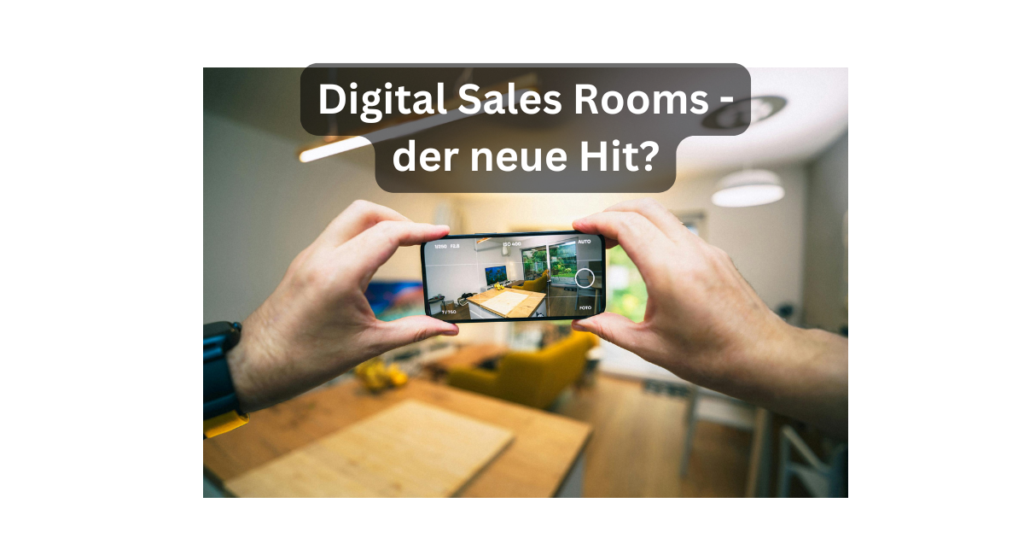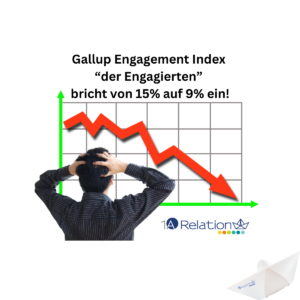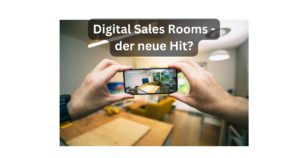Nowadays, it is no longer enough to simply make customers a good offer. B2B buyers are better informed thanks to their own preliminary research, expect a personalized customer journey and want to be able to interact without hurdles – this is precisely where a Digital Sales Room (DSR) comes into play.
But what exactly does that mean? And how do they differ from classic CRM, CX or e-commerce approaches? What are the advantages and disadvantages? Are there differences between B2B and B2C? And many more questions that we will answer in this article.
What is a Digital Sales Room?
A Digital Sales Room (DSR) is an interactive, personalized sales platform that centrally bundles all relevant information, offers and communication options for the customer.
More than 30 products are currently listed in this category on OMR Reviews.
Here is a video by Along that describes it quite well.
In the interest of fairness, here are the two links to Along and Emlen, the top two 100 finishers in the OMR Reviews hit list
Key features of a digital sales room
- Personalized customer interaction – content, offers and presentations tailored to the customer.
- Self-service functionality – customers can access documents, sign contracts and communicate with sales around the clock.
- Analytics & Tracking – Sales representatives can see which content is particularly relevant and can follow up.
- Interactive experiences – 3D product presentations, videos, webinars & AI-supported conversations.
A digital sales room is more than just a CRM or an e-commerce store – it is an interactive sales room that is transforming B2B sales.
🆚 Differentiation from CRM, CX & E-commerce
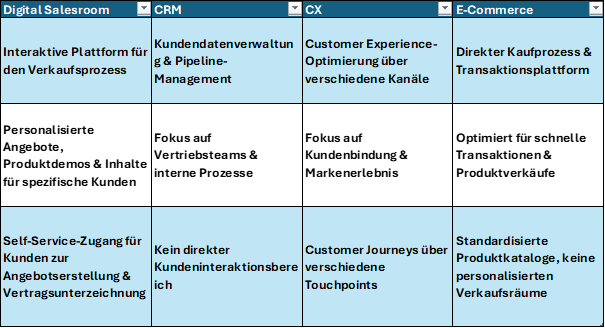
💡 In short:
👉 A digital sales room is an interactive sales platform, not just an administrative tool like a CRM or a transaction-driven shop like in e-commerce.
🛠 When and how should a digital sales room be used?
A DSR is not necessary in every sales context, but it is a real game changer, especially in B2B sales, for complex sales processes or for products that require a lot of advice.
Typical use cases
- Complex, high-priced products & solutions (e.g. IT, mechanical engineering, software, consulting services).
- Multi-stage B2B sales processes with different stakeholders.
- Long-term contract negotiations that require various documents, presentations and interactions.
- Hybrid or remote sales teams that want to provide optimal customer care without physical contact.
🔹 Useful integrations:
- CRM systems (e.g. HubSpot Sales Hub, Salesforce) – automatic transfer of contacts & deals.
- E-signature tools (e.g. Skribble) – sign contracts directly in the sales room.
- Marketing automation (e.g. Evalanche, Brevo) – send personalized content to potential buyers.
- Webshop integrations – if digital ordering options are to be integrated directly.
🕶️ Do you need VR/AR for digital sales rooms?
Not necessarily – but for certain industries it can be a game changer.
🚀 When does VR/AR make sense?
- Immersive product presentations for products that require explanation (e.g. mechanical engineering, medical technology, real estate).
- Virtual trade fair stands & customer events for interaction in a digital environment.
- Training & education directly integrated into the sales process.
However, in many cases a digital sales room is sufficient without VR/AR – the technology should only be used if it offers real added value.
🏢 Advantages of digital sales rooms compared to classic showrooms and retail stores
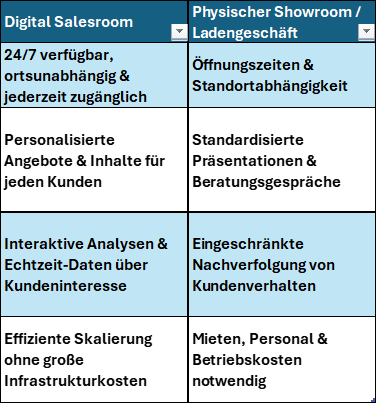
💡 Conclusion: A digital sales room does not replace face-to-face meetings, but complements them – and ensures better digital customer care.
🎯 What questions should companies ask themselves regarding digital sales rooms?
- How does a digital sales room specifically increase the conversion rate?
- How can sales teams work more efficiently with DSRs?
- What best practices are there for using digital sales rooms?
Why are digital sales rooms (DSR) primarily intended for B2B – or are there also B2C use cases?
Digital sales rooms are primarily intended for B2B because they are geared towards complex purchasing processes, products that require a lot of advice, and long-term customer relationships.
💡 Typical features of a digital sales room that make it more suitable for B2B:
- Multi-stage decision-making processes – several stakeholders (purchasing, management, technology) need to be convinced.
- Customized offers and contracts – personalized offers, discounts and negotiations are necessary.
- Long-term customer relationships – The sales process does not end with the purchase, but also includes after-sales support, training and service contracts.
- Consulting-intensive products – Often the products are customized or technically complex, which is why detailed information and presentations are necessary.
Document and data management – The DSR serves as a central hub for contracts, presentations, white papers and training materials.
Are there also B2C examples of Digital Sales Rooms?
Yes – but they are less common and mostly found in industries with high-priced or consulting-intensive products.
🔹 Possible B2C use cases for Digital Sales Rooms:
- Automotive industry: individual configuration, 3D display of vehicles, personal purchasing advice & online contract conclusion.
- Luxury goods & custom-made products: personalized & virtual presentation of high-quality furniture, jewelry or fashion.
- Real estate & financial services: virtual tours, consultations, document management & contract conclusion on one platform.
- Exclusive club or subscription models: personalized premium advice for high-quality products or services.
Example: Tesla has a kind of “digital salesroom” where customers configure their vehicle, go directly through financing options and are guided through the entire purchase process.
💡 BUT: In B2C, these processes are usually integrated into e-commerce or omnichannel solutions – a dedicated DSR is often not necessary because purchasing decisions are made more quickly.
Ergo as in the examples above: Especially for complex or very expensive products and services, it can be useful.
All information about the topic Sales can be found here
Which B2B use cases show the value of Digital Sales Rooms particularly clearly?
Some industries benefit particularly from Digital Salesrooms because they have a high demand for consulting, long sales cycles and many stakeholders.
1️⃣ IT & Software Sales (SaaS, ERP, CRM, MarTech)
Why use a DSR?
Customers need to understand various features, license models and integration options.
- Often involves several decision-makers (IT, marketing, finance, CEO)
- DSR offers demos, whitepapers, use cases and price comparisons – individually compiled for each company.
✅ Example:
👉 Vendors of more complex software products can use a DSR to guide new customers through product demos, case studies, and pricing options.
2️⃣ Mechanical engineering & industry 4.0
💡 Why use a DSR?
- Complex machines and production plants need to be explained in detail.
- Involves buyers, technicians, and managing directors
- Product configurators, 3D views, interactive maintenance instructions and ROI calculators help with the purchase decision.
✅ Example:
👉 A manufacturer of robotic solutions for the automotive industry can offer individual solution packages via a digital salesroom – including interactive product videos and cost-benefit analyses.
3️⃣ Medical technology & pharmaceuticals
Why DSR?
- Medical devices and pharmaceutical solutions require detailed explanations.
- Training, regulatory requirements and product documentation must be centrally available.
- demos, white papers and live consultations help clinics and laboratories make purchasing decisions.
✅ Example:
👉 A provider of AI-supported diagnostic systems could offer test access, live demos and clinical studies in a DSR.
4️⃣ Construction & Architecture (B2B real estate, large-scale projects)
Why use DSR?
- Several parties are involved in large infrastructure projects (developers, architects, authorities).
- plans, 3D visualizations & tender documents must be centrally available.
- meetings, contract management & status updates on one platform.
✅ Example:
👉 A provider of sustainable building technologies could make project plans, CO₂ calculations and ROI analyses available via a DSR.
🎯 Conclusion: When is a Digital Sales Room really worthwhile?
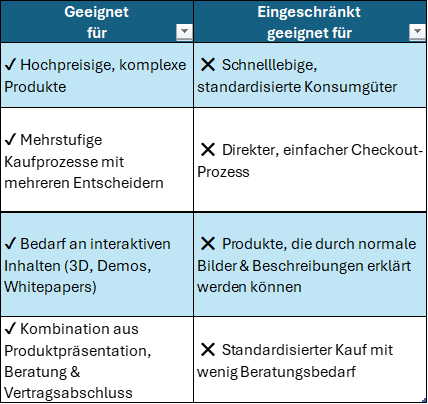
📌 In short:
digital sales rooms are a powerful tool for complex B2B sales processes – not necessary for every industry, but a real game changer when used in the right way.
📊 Conclusion: pros and cons of digital sales rooms
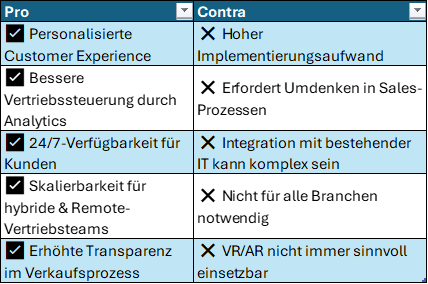
📢 What about you?
- Are you already using Digital Sales Rooms or are you planning to use them?
- What would be possible uses and advantages over the previous approach?
- What have your experiences and challenges been so far?
Join the discussion! 👇💬

